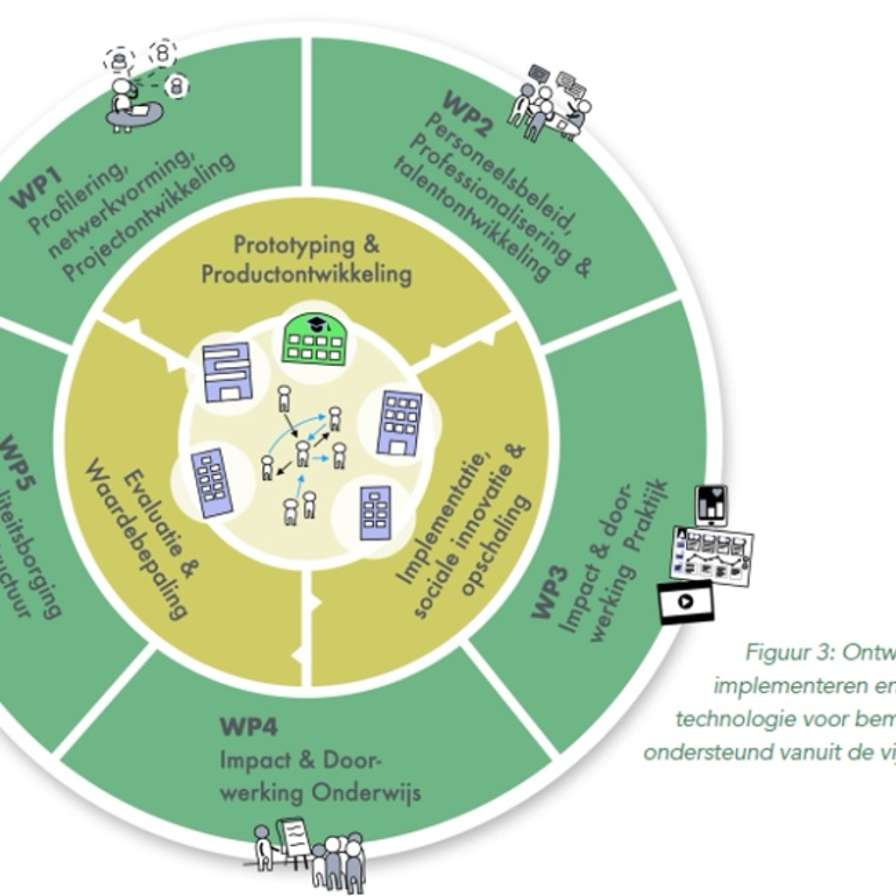Spirit: Collaborating for person-centred care through integrated, robust, and innovative technology

Within SPIRIT, research groups from universities of applied sciences are actively engaged in exploring how technology can be used to support humane and person-centred care. They are organised as a so-called “SPRONG group”, forming a strong research foundation for and with professional practice. The foundation of this SPRONG group consists of eleven research professorships (lectors) focused on the development and implementation of healthcare technology. These groups have been collaborating for several years within the national Platform for the Use of Technology in Health and Wellbeing (PIT), a network of research leaders in this field.
More SPIRIT for the Healthcare Professional
SPIRIT focuses on the development, implementation, and evaluation of technology for Humane and Person-Centred Care (TvBZ).
By keeping care humane, we refer to everything that enables healthcare professionals to perform their work with quality, satisfaction, and well-being. Reducing workload and using the (increasingly scarce) healthcare workforce more intelligently both contribute to this goal.
A National Collaboration for Faster Technological Innovation
The purpose of uniting the participating research groups nationwide within the SPIRIT consortium is to accelerate and strengthen technological innovation in healthcare.
Across the Netherlands, many innovative projects and pilots are currently underway.
National Collaboration Among Nine Universities of Applied Sciences
Healthcare and knowledge institutions, as well as entrepreneurs, often work regionally and in their own ways—while valuable expertise already exists elsewhere in the country.
Questions such as How do you co-design with a specific target group?, How do you effectively implement a particular technology?, and Which evaluation methods best demonstrate added value? are central to this collaboration.
By intensifying national knowledge exchange in the areas of healthcare content, technology, and methodology, we can learn more quickly from each other and accelerate innovation processes—for healthcare professionals, entrepreneurs, educators, and practice-based researchers alike.
Just as important: this collaboration promotes greater uniformity and alignment in methodological approaches, and reduces fragmentation and overlap in innovation projects. In the long run, this eases the pressure on the healthcare workforce and supports entrepreneurs in developing their innovations more efficiently.
Towards Better, More Humane Care
Within the activities of the SPRONG group (and its underlying projects), attention is given to all phases of technological innovation.
In addition to the current activities related to evaluation and value assessment, similar steps are being taken for research into product development, implementation, and scaling up of healthcare technology. Every technological innovation should, ultimately, lead—plausibly and measurably—to better, more humane care.
All healthcare domains are represented within the SPRONG group’s activities: participating partners come from elderly care, disability care, hospital and rehabilitation care, as well as mental health services (GGZ).
Team
Windesheim University of Applied Sciences
AUAS Research Group Digital Life – Somaya Ben Allouch
Funding
SPRONG | Regieorgaan SIA
Partners
Windesheim University of Applied Sciences
Rotterdam University of Applied Sciences
NHL Stenden University of Applied Sciences
Saxion University of Applied Sciences
Utrecht University of Applied Sciences
Zuyd University of Applied Sciences
HAN University of Applied Sciences
Fontys University of Applied Sciences
Omring